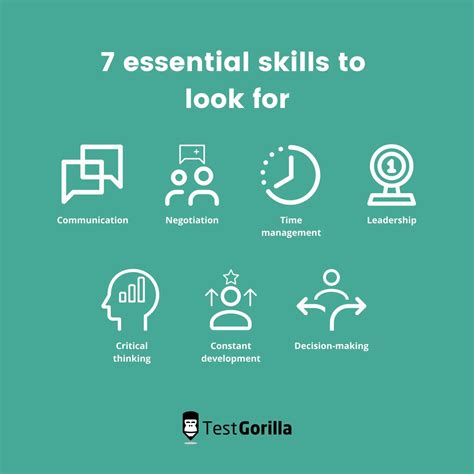In today's rapidly evolving digital landscape, the role of a tech marketer has become increasingly complex and multifaceted. As technology continues to advance at an unprecedented rate, marketers must stay ahead of the curve to remain effective. In this article, we will explore the 7 essential skills that every tech marketer should possess to succeed in this dynamic industry.
Understanding Your Audience

To effectively market technology products or services, you need to have a deep understanding of your target audience. This includes their needs, preferences, pain points, and behaviors. Developing buyer personas can help you tailor your marketing efforts to resonate with your audience. By understanding your audience, you can create targeted marketing campaigns that speak directly to their needs, increasing the likelihood of conversion.
Identifying Key Audience Segments
- Demographics: age, location, job title, industry
- Psychographics: values, interests, lifestyle
- Firmographics: company size, revenue, industry
- Technographics: technology adoption, usage, and attitudes
Content Creation and Storytelling

In the tech industry, content is king. As a tech marketer, you need to be able to create engaging, informative, and compelling content that resonates with your audience. This includes blog posts, social media updates, email newsletters, and more. Storytelling is a crucial aspect of content creation, as it allows you to connect with your audience on an emotional level. By crafting compelling narratives, you can make complex technical concepts more accessible and memorable.
Types of Content to Create
- Blog posts
- Social media updates
- Email newsletters
- Whitepapers
- Case studies
- Webinars
Data Analysis and Interpretation

As a tech marketer, you need to be able to collect, analyze, and interpret large amounts of data. This includes website analytics, social media metrics, email open rates, and more. By understanding how to interpret data, you can make informed decisions about your marketing strategies and tactics. Data analysis also allows you to measure the effectiveness of your marketing efforts, making it easier to optimize and improve your campaigns.
Key Metrics to Track
- Website traffic and engagement
- Social media metrics (e.g., followers, engagement rate)
- Email open rates and conversion rates
- Lead generation and conversion rates
- Customer acquisition and retention rates
Digital Marketing Channels

In the digital age, marketers have a wide range of channels to reach their target audience. As a tech marketer, you need to be familiar with various digital marketing channels, including social media, email marketing, search engine optimization (SEO), pay-per-click (PPC) advertising, and more. By understanding the strengths and weaknesses of each channel, you can create a comprehensive marketing strategy that reaches your audience where they are most active.
Key Digital Marketing Channels
- Social media marketing
- Email marketing
- Search engine optimization (SEO)
- Pay-per-click (PPC) advertising
- Content marketing
- Influencer marketing
Marketing Automation and Tools

Marketing automation and tools can help streamline and optimize your marketing efforts. As a tech marketer, you need to be familiar with various marketing automation platforms, such as Marketo, HubSpot, and Pardot. You should also be knowledgeable about tools like customer relationship management (CRM) software, social media scheduling tools, and email marketing platforms.
Key Marketing Automation Tools
- Marketo
- HubSpot
- Pardot
- Customer relationship management (CRM) software
- Social media scheduling tools
- Email marketing platforms
Project Management and Collaboration

As a tech marketer, you often work on multiple projects simultaneously, requiring effective project management and collaboration skills. You need to be able to prioritize tasks, manage timelines, and coordinate with cross-functional teams. By using project management tools like Asana, Trello, or Basecamp, you can stay organized and ensure that projects are completed on time and within budget.
Key Project Management Tools
- Asana
- Trello
- Basecamp
- Slack
- Google Drive
Staying Up-to-Date with Industry Trends

The tech industry is constantly evolving, with new trends and technologies emerging every year. As a tech marketer, you need to stay up-to-date with the latest industry trends to remain effective. This includes attending conferences, reading industry blogs, and participating in online forums. By staying informed, you can anticipate changes in the market and adjust your marketing strategies accordingly.
Key Industry Trends to Follow
- Artificial intelligence (AI) and machine learning (ML)
- Internet of Things (IoT)
- Blockchain and cryptocurrency
- Virtual and augmented reality
- 5G and edge computing






What are the most important skills for a tech marketer to have?
+The most important skills for a tech marketer to have include understanding their audience, content creation and storytelling, data analysis and interpretation, digital marketing channels, marketing automation and tools, project management and collaboration, and staying up-to-date with industry trends.
How can I stay up-to-date with the latest industry trends?
+You can stay up-to-date with the latest industry trends by attending conferences, reading industry blogs, and participating in online forums.
What are some key digital marketing channels for tech marketers to focus on?
+Some key digital marketing channels for tech marketers to focus on include social media marketing, email marketing, search engine optimization (SEO), pay-per-click (PPC) advertising, content marketing, and influencer marketing.
As a tech marketer, you have a wide range of skills to master to remain effective in this rapidly evolving industry. By focusing on understanding your audience, content creation and storytelling, data analysis and interpretation, digital marketing channels, marketing automation and tools, project management and collaboration, and staying up-to-date with industry trends, you can stay ahead of the curve and drive success for your organization. Remember to continuously educate yourself and adapt to new technologies and trends to remain competitive in the tech marketing landscape.
